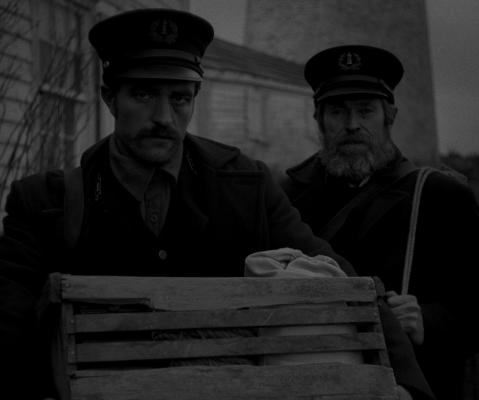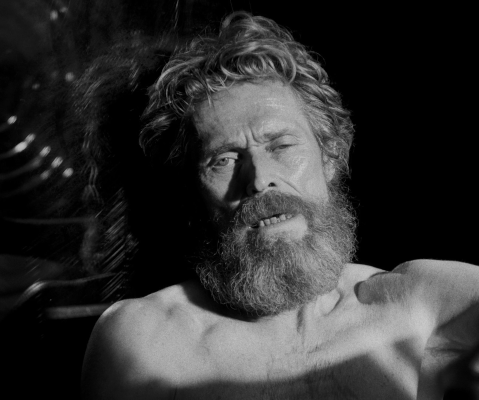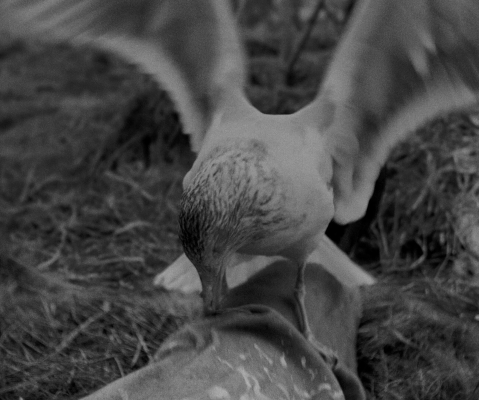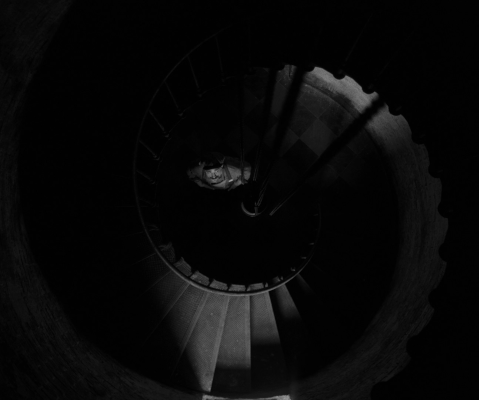As with Knives Out, Breaking Bad, and Old Boy, there is some media where I am concerned that by having an opinion, my mere me-ness is very much part of how that opinion is (and should be) perceived. Simply put, there’s a canon of media that I think millenial white guys are a little too excited to talk about, like they’re markers on a talent tree. I feel like there’s an envelope of time, now stamped down into wikis and articles, where people spilled all their thoughts and their feelings and then everyone else who was feeling a bit of the same stepped into the same space and sought some way, any way, to capture that they were feeling the same way, that they were also tangled up inside about this thing and what it meant and they weren’t thinking about it, they were feeling about it, but feelings are hard, and pointing out the reference to Sascha Scheiber’s Hypnose is a fact that can be collected and cleaned and pinned and then…
The feeling has a place to go.
Not going to spoil anything about this movie beyond its broad genre and invocations. You should watch it on your own if you think you can handle two hours of grown men losing their minds in isolation. I’m not going to tell you about what’s in it, as much as I’m going to try and tell you about how I feel about it, and what I feel about what it’s not.
Sooo, uh, first of all: This movie fucks. Not ‘holy shit, this fucks, I want this on as my sex jam,’ but it’s rancid with sexuality, just steeped in the kind of horny of two people who definitely fuck, who want to fuck, who might even fuck each other but absolutely are not going to, haha, unless? There’s this artwork, by Barbara Kruger, called Untitled (You Construct Intricate Rituals), which has been picked up by the internet as a sort of graffiti tag to underscore the ways in which men – yes, men, always men, so often men – will devise nonsense reasons to touch one another in intimate ways. There’s a contrast in life between the joy of their smiles and the energy of their violence, and that is the way in which this movie fucks. It’s the nasty, musty, smelly kind of fucking, it’s the maft of a space where the default smell is the sea and the spaces of people are full of these intimate wet smells. It’s not a story that’s sexy — there’s so much work, I feel, to put effort into making this story high effort, highly tactile and experiential… and then to make that experience the smell of a pair of boxers someone’s been wearing for a week because they’re not going anywhere and have given the fuck up.
I guess given that it’s a story about a pair of dudes being isolated on a island in a lighthouse, I’d guess I was kinda expecting the feeling to be about deprivation, to be about not having enough of anything, and then the rawness that came from feeling empty. After watching it though, I feel the opposite is true — it’s a movie about being overfilled, about having too much, about being overwhelmed by something. There’s this constant indulgence, this excess to how they behave. Shots hang on these experiences longer, and even things I think of as jokes kinda hang on longer than I feel like they should.
Drip by drip, this movie fills, fills, fills, and I drown in it.
It’s not Lovecraftian, by the way. I mean, I don’t feel like this has anything of Lovecraft’s work to it, beyond the fact that he was also scared of the ocean. If nothing else, trust me on this: Lovecraft stories don’t fuck.
Without being glib, though, Lovecraft’s work is often tightly coiled around indifference. The world doesn’t care about you, your privilege is meaningless, your education, your value (as a white man from Boston) does not protect you, and that there are things in the universe that do not and will not ever care about you existing. You are a plaything not because you are hated and punished, but because you do not matter. The world of Lovecraft’s horror is full of things that do not realise they hurt you and they do not care.
I almost wish when I first brought this up to my friend Rachel, she hadn’t said it to me because it’s too perfect, but the feeling I get of the horror in The Lighthouse is more of that old time religion. If you grew up like I did in a Christian country, you probably learned about the Greek pantheon from a fundamentally Christian perspective – which usually means, Zeus first, he’s in charge, he does a bunch of stuff because he’s in charge, and then you fill out the pantheon around him. Eventually you get around to learning about his backstory and how he has a dad who sucks, and that’s all good and interesting enough, but it still means that typically, Greek Myth is presented as having a coherent structure that centralises around Zeus.
And it doesn’t.
The earliest stuff we know we can find seems to suggest that Poseidon predates Zeus – that while as much as we know ‘Greek’ as a thing, Zeus and Poseidon showed up together, but before that point, when Zeus was introduced to stories, Poseidon was already there. Poseidon, which we associate with the sea, seems to have been at a time, a god of earthquakes and the underworld — as if there was some seeming obvious connection between the place everyone lived and the old dark deep.
That’s the horror of the Lighthouse. It’s feeling unattached to the life that fills you up, and rather than finding peace, you find something else
waiting there
to fill you up.
There’s also something to be said for how violence expresses in The Lighthouse. It’s not easy, it’s not clean. A lot of media simplifies the violence of men fighting – usually to save time, sometimes to clean up stunts, and often just because: You don’t need to see what it takes to punch someone so many times they pass out from pain. A clock in the head and they go down and the story can continue and also, people come out of that experience, largely, fine.
It’s weird because yeah, people can take a few hits better than movies make you think but also they can’t take being knocked unconscious as easily as movies make you think.
Anyway, uh, the violence in The Lighthouse feels a lot more brutal and a lot more honest? Like when a guy punches someone a bunch and stops, there’s this thought in my mind that oh okay, so he knocked him out and he stopped. But nah…
Nah, then you see the other guy groaning and whimpering.
It was a choice to stop, which usually happens sometime around when you notice your breathing or your hand hurting.
I feel like the ending is also really intentional, but also deliberately vague. I could point out all sorts of things happening in it, but then it’d feel more like a list of ‘this movie about a loss of a grip on reality has deliberate breaks from reality!’ like I’m just arguing that the movie exists at all. It almost feels like it was deliberately chosen to make sure you can’t take it entirely literally.
And I guess that’s how I feel about this movie. I enjoyed the experience of being unsettled by it, I liked how it refused to answer me, and I felt impressed by what it was willing to overdo.




1 Comment
@updates Watched this the other day while I was handling packages. Probably be thinking about it for a bit. Wild filmmaking.